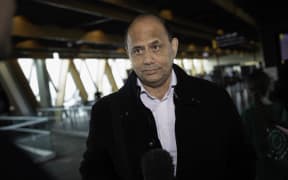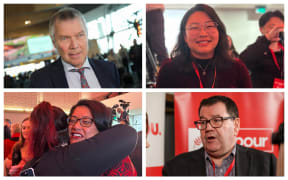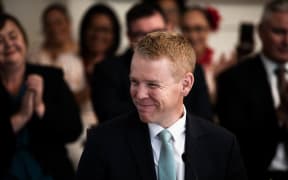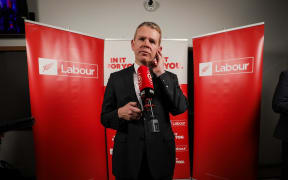By Bryce Edwards*
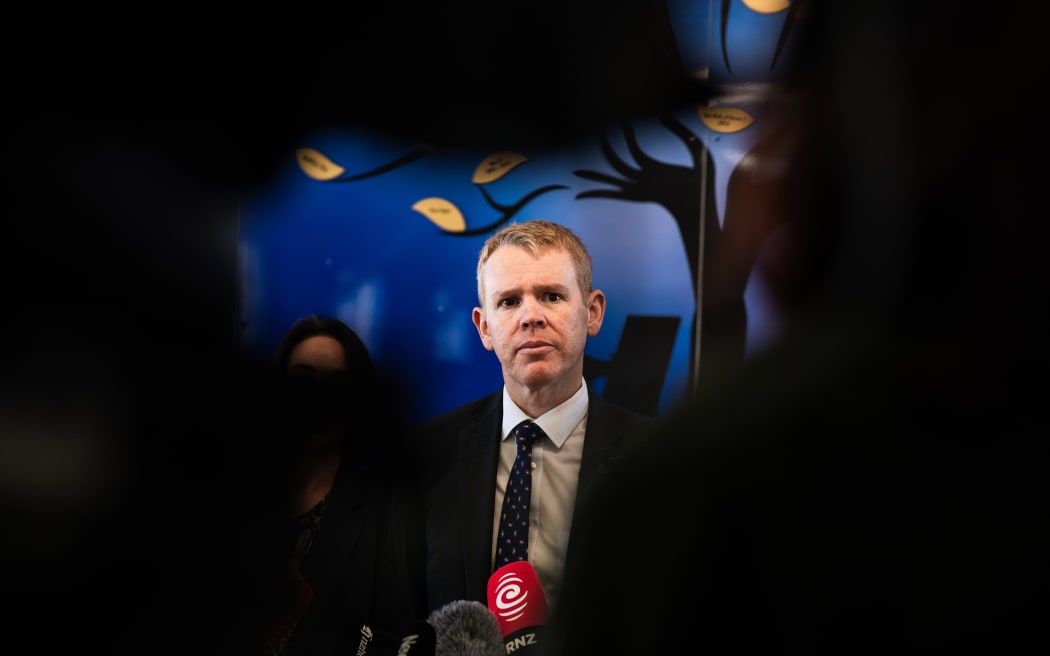
The Herald's Simon Wilson blames Hipkins for not being bolder. Photo: RNZ / Samuel Rillstone
Analysis - The Labour Party has crashed from 50 percent of the vote in 2020 to around 27 percent in 2023. The election loss has been described in the media over the weekend as a "bloodbath", "horror show", "utter devastation", "a loss of biblical proportions", and a "historic defeat".
What are leftwing and progressive commentators saying about what went wrong and what Labour now needs to do?
Labour's forgotten working class traditions
Former Alliance president Matt McCarten, who was Labour's Chief of Staff under David Cunliffe and Andrew Little, is scathing about the current state of the Labour party, describing the party as disconnected from its voters, especially the poor and working class.
McCarten told Newsroom's Aaron Smale that Labour has been taken over by middle class people and concerns: "They look down on the working class. 'We love the poor, but they smell.' Because they're not part of them. They're in the leafy suburbs, the hip suburbs, the Grey Lynns of this world. And they don't live amongst the working class, they're not of them. They are missionaries. That's what Labour does, 'we do nice things for people. But we don't rock the establishment, we don't rock the middle classes. We keep them quiet'."
According to McCarten, the Labour Party reflects a global tendency for leftwing political movements to eschew the working class in favour of "managerialism" and social issues, which means it can no longer articulate the problems and solutions of ordinary people.
He says from the Helen Clark era onwards, the best Labour has been able to offer is to manage capitalism better than National and be nicer: "They're not visionaries, they're just nice people. Well f*ck that, when you're poor, you don't care if they're nice or not nice. You just want hope."
Leftwing political commentator Josie Pagani agrees, writing in the Post that Labour has lost its class focus: "The priorities of traditional Labour supporters, working people on low incomes, were put lower on the agenda than the priorities of the urban middle class. Jacinda Ardern was willing to spend $678 million to subsidise businesses to decarbonise, for example, but said free dental care, at roughly the same cost, was an unaffordable dream." She argues Labour can no longer be identified with any great causes.
Similarly, leftwing political writer Max Rashbrooke tweeted in the weekend that Labour has lost its identity and purpose, and this was a problem before the party won power in 2017: "Labour didn't have a clear set of priorities or a coherent view of the world it wanted. Hadn't done the work in opposition; and like global counterparts, unsure what being 'Labour' means now."
As a result, Rashbrooke says Labour doesn't focus enough on the needs of working people: "The failure to do anything meaningful on the colossal modern issue of insecure work - even though helping 'labour' is literally in the name - is especially striking and speaks to a long term failure of nerve, vision and willingness to shift the narrative on key issues. Priorities were never clear, except when they really dug in on something - like 3 Waters - and people went, 'Oh, so *that's* a priority. Who knew?'"
He says the Labour needs a deep rethink "of its core ideology, strategy and policies".
A failure to focus on economics
Labour's disconnect from the importance of the economy and people's day-to-day struggles was epitomised by Prime Minister Jacinda Ardern's insistence that no cost of living crisis was occurring under her watch.
By the time the election rolled around, it became all about the state of the economy and living standards and, according to Listener writer Danyl Mclauchlan, Labour never managed to grasp this: "After promising to focus on the cost of living, Labour delivered piecemeal handouts - subscription subsidies, the GST exemption - which were more than cancelled out by their increases in fuel taxes. In a campaign in which the nation demanded change, Hipkins promised stasis."
The Spinoff's Hayden Donnell also cites Hipkins' decision to reject radical tax reform for Labour's demise: "Hipkins' 'captain's call' sealed off election opportunities for Labour…. Without real tax relief to offer people on lower incomes, Hipkins became a salesman with nothing to sell".
And Donnell says that this was a real problem during a cost of living crisis: "When it came time to present his alternative, Hipkins could only offer 45c off parsnips and some free dental for some people in three years' time."
Leftwing political commentator Gordon Campbell also singles out Labour's weak economic policies as one of the main reasons the public lost faith in the government. In his column he argues the 2020 administration had a mandate to "carry out the radical left wing surgery that the country's various ills required".
Campbell lists what this might have looked like: "A more radical agenda could have included a capital gains tax, a wealth tax, meaningful anti-trust action against the virtual cartels being run by banks and supermarkets, a windfall tax on their profits, making Working for Families income supports available to beneficiary families, funding Kiwibank so that it can compete significantly with the Aussie banks etc etc."
Constitutional and co-governance reform
If Labour was less focused on traditional leftwing, economic or working class concerns, then what has been the party's reform programme while in government? Some critics on the left have identified co-governance and related decolonisation agendas as filling the void in Labour's reform agenda, arguing that Labour's Māori caucus became increasingly dominant in the government and determined to deliver a radicalism that would help retain their seats from the revived Te Pati Māori.
For example, writing for the Interest website, Chris Trotter paints a picture of the 2017-2023 government being equally as radical as David Lange's Fourth Labour Government, and having now been punished in a similar way to the 1990s when Labour's vote plummeted and even Phil Goff lost his Mt Roskill seat to National.
But whereas the Lange/Douglas Government was radical in terms of a rightwing economics programme, Trotter suggests the Ardern/Hipkins Government was radical in terms of wholesale constitutional reform and "co-governance in particular - that were growing out of the Crown's newfound commitment to 'indigenisation' and 'decolonisation'".
Trotter argues that Labour never managed - or even tried - to take the public along with its big reforms, seeking to suppress debate rather than openly communicate their changes: "Massive changes in education and health policy were introduced without adequate explanation or justification. Jarring changes in the linguistic structure of official communications were implemented without consultation, leaving many New Zealanders feeling culturally disoriented and politically ignored."
Although the Herald's Simon Wilson supports co-governance, he also blames Labour's approach to implementing this policy, saying good people felt estranged by co-governance. As with many of its other reforms, Wilson suggests that Labour did so in a top-down way, failing to take communities with them.
Covid-19 and conservatism
Wilson wrote that Covid-19 was partly responsible for Labour's demise, as the pandemic's hangover lingered: "The social trauma has been far deeper and more widespread than expected".
And he also blames Hipkins for not being bolder: "He failed to grasp that voters who want change actually do want change and won't settle for trivialities. GST off the veges, but no structural tax reform? Was it a joke? Nope. It was a betrayal".
Wilson also makes the very good point that Labour's fear of boldness and change was actually self-defeating, because voters did want action: "Labour was scared of change. One of the great fallacies in politics is that there is a big middle ground of voters who like quiet moderation. Actually, voters want things to be better. Those who swing from one party to another are not looking to reinforce the status quo. They have become disillusioned and want a shake-up."
Progressive business journalist Bernard Hickey argues that Labour's loss came from its desire to go into government promising great transformation that couldn't be delivered by remaining economically orthodox: "Labour lost the 2023 election in 2017 when it committed to the Budget Responsibility Rules, while also committing to 100,000 Kiwibuild homes, the Auckland CBD-Airport rail line, welfare reform and a capital gains tax review. They were incompatible and the inevitable disappointment upon failing on Kiwibuild, light rail, and welfare reform".
He believes that the government's Covid response was an additional factor in its demise: "The revolt against government over the Covid restrictions in late 2021 punctured that 2020 election bubble."
Listener writer Danyl Mclauchlan also cites Covid and failure to deliver on promises: "Hipkins was indirectly responsible for much of his party's decline. He was minister for Covid, and the early phase was a triumph that voters rewarded in 2020. But 2021 saw one of the slowest vaccine rollouts in the OECD after the government failed to negotiate purchase agreements with pharmaceutical companies. The lack of vaccine coverage led to the sustained Auckland lockdown of late 2021, a policy failure that the nation's largest city has punished them for by delivering a number of Labour's safest seats to National. Mt Roskill and New Lynn have fallen, Mt Albert and Te Atatū look set to fall. Hipkins was also minister for health, education, police and public service: all areas in which his government's legacy is questionable at best."
What happens next for Labour?
It's clear that Labour now needs to do a lot of soul-searching, or even to rediscover its political and ideological soul.
Unfortunately, the Labour caucus is rather lacking in personnel at the moment who might achieve this. Gordon Campbell argues that Hipkins' replacement can't be Grant Robertson, who "is not only past his 'use by' date, but has been more part of the problem than part of the solution, starting with his decision to bind Labour to Blairite budget constraints."
He nominates David Parker as "the best option among Labour's surviving roster of senior MPs who might have the will and the ability to shift Labour back in the leftwards direction necessary", and he's "the only potential leader able to sort out Labour's pressing existential problem of deciding what its purpose is".
Other leadership options currently being talked about include Carmel Sepuloni, Peeni Henare, and Barbara Edmonds.
Whoever is chosen, Campbell recommends that they keep away from the lobbyists, businesspeople, and focus groups Labour has relied upon so heavily for the last six years in power. Only then will Labour be able to reconnect with its traditional values.
Simon Wilson says Labour faces "the existential question: What is the point of Labour in the 2020s?" He suggests the problem is that the party is against change, and unfortunately, the political right has now claimed the role of giving optimism and hope to ordinary people.
According to Josie Pagani, Labour needs significant renewal, and to reach outside the party for debate and ideas - something she says the party hasn't done for a long time.
Finally, she offers the following example of how complacency can be fatal: "The French Socialist party is a salutary reminder of the alternative. After many decades in and out of government, the party cratered on just 1.75 percent of the vote in 2022. Parties that don't change sometimes disappear."
* Dr Bryce Edwards is the Political Analyst in Residence at Victoria University of Wellington. He is the director of the Democracy Project.
